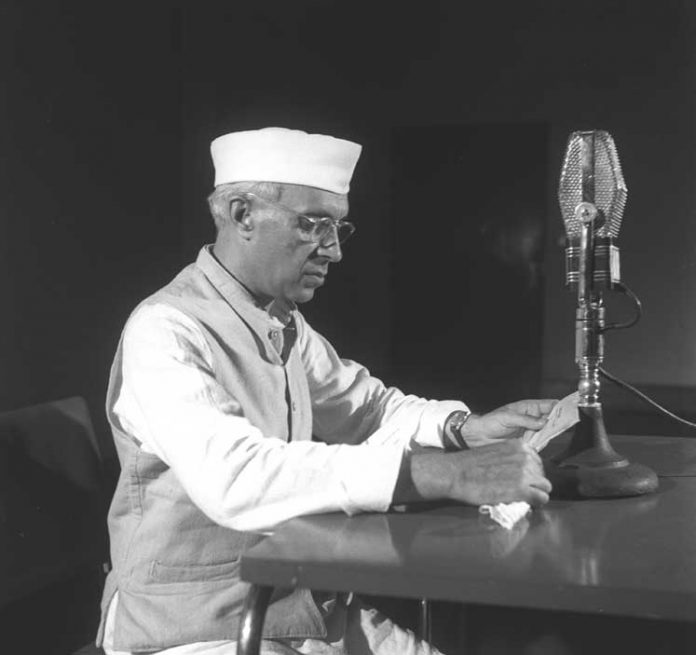Not many bilateral conflicts have been as seemingly averse to resolution as the Kashmir dispute. Very few bilateral disputes seek to destabilize regional security like the Kashmir dispute. The issue of Kashmir dispute came under international radar just after India’s independence when Nehru approached the United Nations. Decades of animosity, hostility, and warmongering on either side found a chance for peace when the two sides signed the Shimla Agreement in 1972, led by Indira Gandhi and Zulfikar Ali Bhutto from Pakistan. India’s dominant attitude towards the internationalization of the Kashmir dispute has been negative, yet it is crucial to remember that it was India which first took up the issue at the international fora.
Jawaharlal Nehru has been widely criticized for his reluctance in accepting the accession of the state of Jammu and Kashmir which its Hindu ruler Maharaja Hari Singh offered the Indian government, after the invading ‘tribesmen’ across the western border were almost approaching Srinagar. While it is true that Nehru, readily agreed to Mountbatten’s suggestion that the Kashmir issue had best be referred to the Security Council, but attributing this decision solely to please Mountbatten would be an exaggeration. The decision has to be understood in the context of the prevailing international atmosphere, where the hope was that the UN would avoid the mistakes of the League which preceded it. However, taking the issue to the international forum effectively meant stepping into a complex web of international pressure, especially given the bipolar international order of the Cold War. India invoked article 35 of the UN Charter which governs “disputes” and falls under Chapter VI, when Article 39 under Chapter VII which deals with the breach of peace was more adept to Indian demands. What this effectively meant was that the UN could look at the issue as “dispute” and not an “act of aggression.”
Unlike India which was committed to a nonaligned stance, Pakistan willingly aligned with the highest bidder in the post-WW II- the USA, which explains why Pakistan was favorably disposed vis-a-vis the dispute in the Security Council through much of the last 70 years. The case was effectively not considered on its merits, but was compellingly reshaped as per the demands of international power politics. This was just the beginning of rude shocks that India received continuously due to the biased attitude of the Anglo-American power axes. Since 1964, the possibility of Pakistan obtaining a favorable resolution from the Security Council diminished because India had developed sufficiently close ties with the Soviet Union to ensure resolutions against India were vetoed in the UN.
There was no serious involvement of outside powers in the Kashmir issue until it exploded into the world stage at the end of 1989. The world community now focused on the need to maintain stability in the subcontinent, rather than focusing exclusively on Kashmir. However, such attempts remained limited in impact owing to India’s resistance to outside mediation in the bilateral dispute.
Several developments have taken place in the region since. While it is true that Kashmir has witnessed episodic terrorist activities since the mid-1960s, what has happened post-1988 has been nothing short of mayhem. What was a mass uprising, with considerable support from the people, gave way to violent assertion against the Indian state led by Islamist forces, by the 1990s. The primacy of terrorist groups led by ethnic Kashmiris notably gave way to Pakistani groups dominating the region. Following the December 2001 attack on the Indian Parliament, India began to aggressively assert the need to put an end to ‘cross border terrorism’.
Following the September 11 attacks, the international scenario witnessed a mammoth transformation with “war against terrorism” being the rallying cry from the US. International opinion took cognizance of Pakistan’s role in ‘exporting terrorism’ and its potential nuclear capability, and India garnered sympathy for its cry to quell jihadist elements operating in Kashmir. With its sustained economic growth, Indian elites aspired to see the country play a more influential role in the international arena. India has also moved from its nonaligned stance to a more nuanced relation with the major powers. For instance, the United States and India have dramatically strengthened their relations and developed a serious strategic partnership. This has lead Pakistan to realize that American ‘facilitation’ may not lead to it’s expected outcome as was assured in the Cold War days.
In the light of the recent attacks in Pulwama, where Pak based terrorist organization Jaish-e-Muhammad (JeM) has taken responsibility for the attack on a convoy of CRPF personnel from Jammu to Srinagar, is a classic example of terrorist violence paralyzing the Kashmir valley. The United States, France, and Russia are just some of the countries which have come forward to condemn the terrorist attack and offered support to India in its attempts to combat terrorism. India responded by launching, what it called “non- military, pre-emptive” airstrike on Jaish training camps inside Pakistani territory, leading scrambling of some Pakistani fighter aircraft against India. This subsequently has raised calls for de-escalation from the international community at large. Meanwhile, India has renewed its calls for the United Nations to blacklist Masood Azhar, leader of Jaish-e-Muhammad. Three previous attempts at this were blocked by China on grounds of lack of evidence and consensus. However, Beijing has adopted a more subtle approach to the Pulwama attack and had backed the UNSC statement that explicitly named JeM. France, UK, US have moved a fresh proposal for Azhar’s designation as a global terrorist, and it is expected that Russia will back the proposal. This together with the UN condemnation is a significant blow to Pakistan, as India continues to lobby for support in the UNSC.
In the face of these developments, Pakistan’s PM Imran Khan has adopted a diplomatic posture which is being hailed as ‘restrained’ in the face of Modi’s hardline strategy. This has the potential of changing the prevailing positive international tide against India which can have grave implications for its long term ambition to play a major role on the international stage.
Kashmir is arguably the most vulnerable province in the world caught in the crossfire between India and Pakistan. Historically, India has had limited options to apply significant pressure on Pakistan, but the changes in the attitude of the international community favoring India and criticizing terrorism, open up newer prospects for India. We must acknowledge that making progress towards a Kashmir settlement requires rethinking. And using the emergent narrative of its attempt to counter terrorism along with revisiting Nehruvian idealism to garner international support might not be the worst option for the Modi government.
Image Credit: Public.Resource.Org via Flicker and it is available under a Creative Commons license.
The views and opinions expressed in this article are those of the author and do not necessarily reflect the official policy or position of The Geopolitics.

The author is a postgraduate student of Political Science, with specialisation in International Relations, Jadavpur University, India. Her research interests include South Asian politics, specifically Indian foreign policy.


